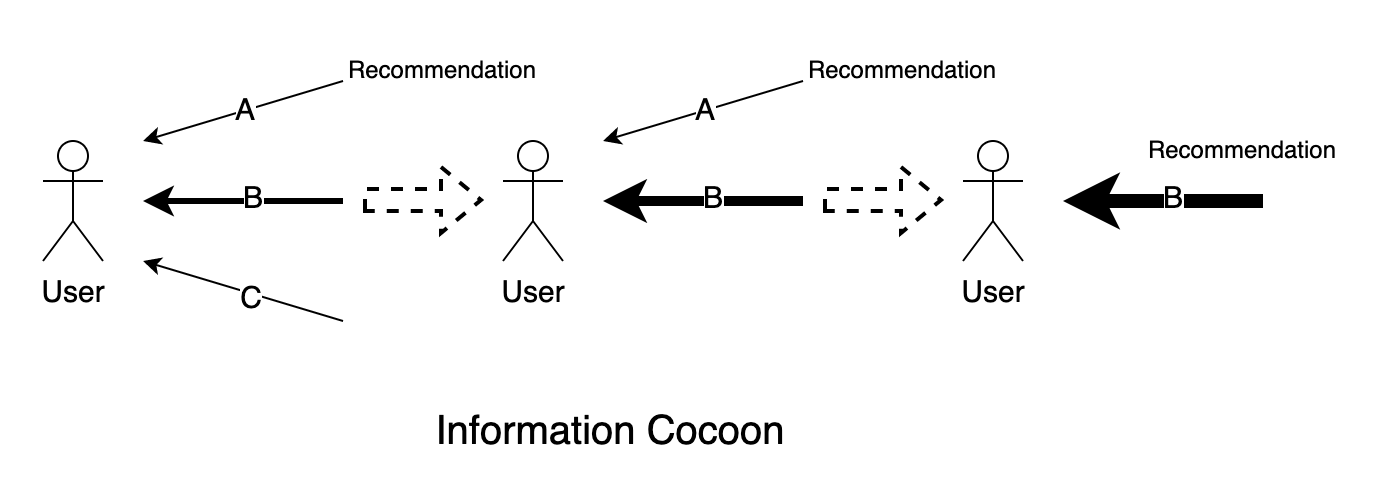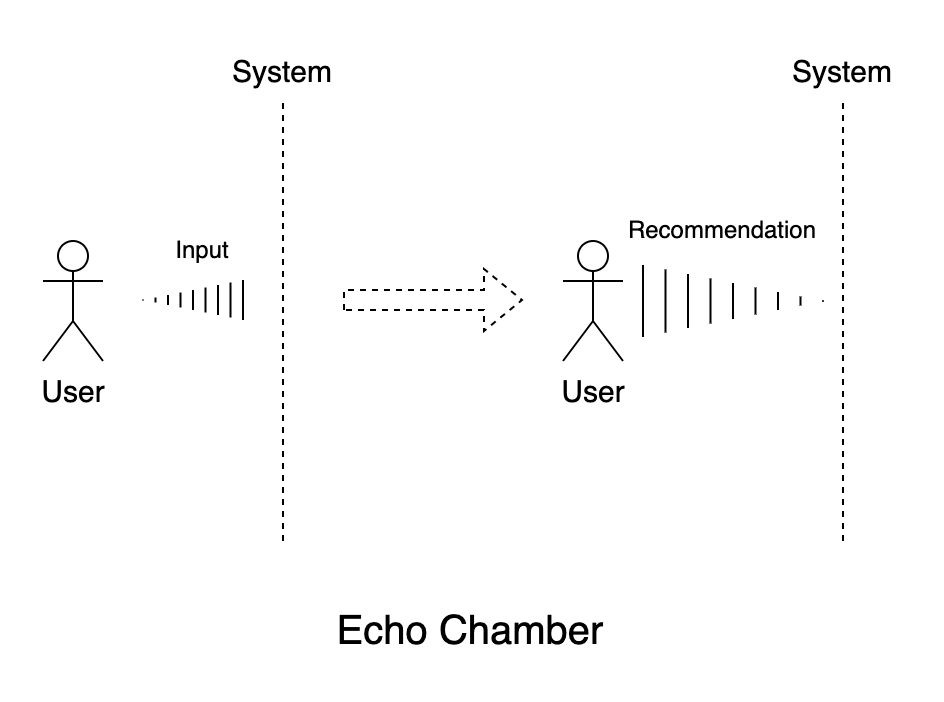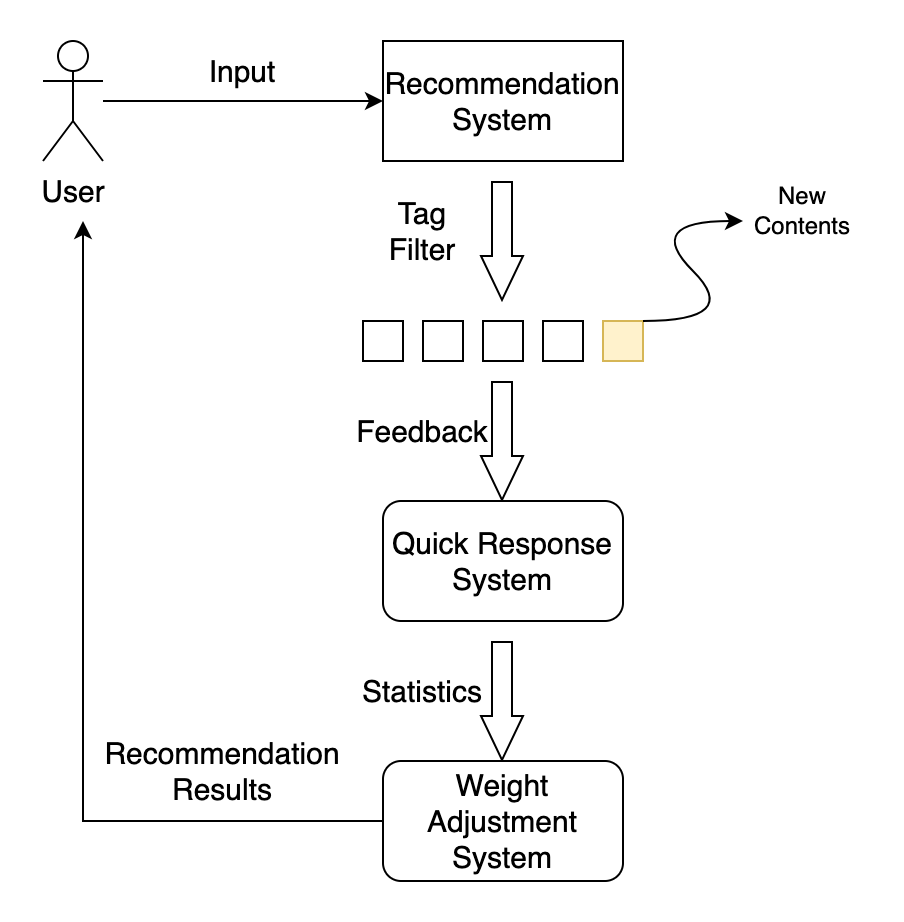Ethical Concerns in Analyzing and Modeling
Information Cocoon and Echo Chamber
One common ethical concern in recommendation systems could be their limited recommendation contents. To be more specific, a recommendation system could only recommend what it believes the user is interested in to this user. This is for making more profits by keeping users' attention on the platform, or just making users click in what is recommended. In this way, the safest way for recommendation systems is to only recommend the contents with the greatest possibility being interested in.
In business, this kind of models works fine, and they could achieve their goals: making more profits. However, by only recommending limited contents could keep users in their own loops. This is called information cocoon. In my view, information cocoon partially violates users' initial consents: In the very beginning, users may think the platform or website would recommend something interesting and new to them, which could make them expand their views and enjoy the platform or website better. However, the fact is that only contents which fall in users' loops would be recommended to them to make more profits. This is somewhat, though not obvious, a violation of the initial consents.

Information cocoon not only limits users' views, but could also lead to some bad results. For online news websites or social medias, their recommendation could represent some kinds of views, ideas and opinions, which would potentially influence people's minds seeing them. This would be pretty harmful and dangerous with some extreme views. Some users may only have some blur thoughts on certain ideas initially, but by being recommended more and more similar contents to enhance their blur ideas, they could be more and more extreme. This is called echo chamber. We have already seen a number of tragedies caused recently by extremists, and it could be really necessary to control the sources.

The key to answer this concern is diversity in views. By giving more chances to users to see different contents, they could enjoy benefits from different aspects, including their views and mental health. In a technical view, I should make some modification on the recommendation algorithm details: Originally, the recommendation system would only recommend top n most similar new contents, without considering other consequences. An acceptable solution could be select some contents that are not that similar, while helpful to make users hear different voices. There should be a reasonable ratio, like 80% similar contents, 20% different contents. This is also helpful to relieve unfaireness of recommendation results between people with different views, like the information that they could receive in their daily life. Some people may suffer from limited views because of living conditions, and the recommendation results that only reflect users' interests would repeat the pattern and enhance the unfaireness in consequence. The extra random recommendation results would open a gate for these users.
On the other hand, what users could see is not only generated by the recommendation system. In this way, I also think it important to corporate with other systems, or there should be a global policy for the platform to encourage users to contact different things. This could be a complete solution to break infomration cocoom and echo chamber.
Biased and Unfair Recommendation Results
Is recommendation alway justice and fair? The answer is no. Companies and individuals could decide to pay for gaining more exposure in recommendation results, and of course some contents would not be recommended to users because of limitation of display spots on UI. And active users' behavior may have greater weight in recommendation systems because of greater quantity, which may force all users to merge into the main stream, but ignoring their own interests. In these scenarios, users are guided by biased and unfair recommendation results, and those losing opportunities of being recommended may suffer.
For the first part, is the way paying to gain more recommendation chances ethical? I think it depends, or it could be acceptable or unacceptable in different scenarios. Generally speaking, it would be more likely to be unacceptable if the recommendation results are tied to some important decisions of users, like medicine or financial suggestions. There could be law requirements in the United States, but this could also be disasters in other countries without specific limitation, and this is why I would like to talk about it here. It would be impossible to delegate the power to the model to decide which is ethical and which is not, and human review must be involved instead. I would not expand too much on human part, but it is good idea to mark all payed-to-display contents clearly to remind users. I prefer to return the right back to users to let them decide whether to click in or not, instead of pretending these contents as normal ones.
The next part is the potential unfairness for contents that are not recommended. This is also related to the last part: greater weight form active users, or opinion leadership, which has been discussed in last chapter for data collection. In this chapter, considering the continuous running of the model, I would gather and store more and more data, so the procedure of identifying opinion leadership could also be a long-term job. By adjusting the weights of opinion leadership users, the model is expected to be more just and fair on this aspect. Beyond this procedure, I would also modify the recommendation preference for the 80% similar contents: instead of top n most similar contents, the chance that has been recommended of each content would also be taken into consideration, and those with smaller chance being recommended would gain greater weight when making recommendation. The goal here is to make all contents gain the chance of being recommended they deserve, not to make all of the contents enjoy the same recommendation chance. In this way, feedbacks from users are important. If some contents always receive relative poor feedbacks, the recommendation adjustment procedure would not be applied to them later on.
(This part is partially being inspired by https://www.searchenginejournal.com/biases-search-recommender-systems/339319/)
Improper Recommendation Results
Besides the Reconnect Program of Facebook mentioned in lecture, there could also be a similar scenario: similar goods are still recommended to users even after users have bought one. This may be frustrating when there are many unnecessary recommendations, and it could be worse after users have found a better choice and become regretful. So the delay of recommendation system without a quick response to people's interest change is also what current people concern. My solution to this is to build a quick response system: if a user has clicked in what the model has recommended, or bought the recommended goods, the model would mark related contents to reduce their weights when making next recommendation. The reduction in weights would be kept until the user clicks in similar contents again, which indicates that the user is still interested in this kind of contents. On the other hand, the feedback system is also important. General recommendation systems always come with a button of "not interested" for each content recommended, while the button rarely works, unfortunately. So an essential way of the quick response system is to make this feedback mechanism work as expected.
Finally, the whole system may look like:
